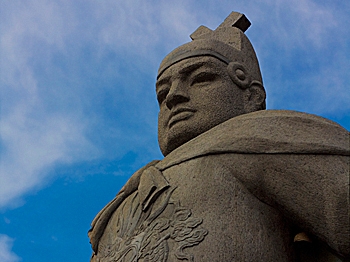Admiral Zheng He was one of the most accomplished explorers in Chinese history. Born in 1371 during the Ming Dynasty, He led a fleet of Chinese merchant vessels on seven expeditions to South Asia, trading goods and developing relations with India, Siam (present-day Thailand), Indonesia, Persia, and East Africa.
The son of a Chinese Muslim family, Zheng He was nicknamed “san bao,” or “three treasures” for his expeditions and service to the emperor.
Yet, Zheng He also was a “taijian,” or eunuch in the Chinese imperial court.
Today, eunuchs—and castration—are almost taboo, delineated by modern works as confused, anomalous, or oft-troubled individuals. But eunuchs held a variety of functions in society—in the imperial court, as singers, guardians of women, religious servants, and military commanders.
The term eunuch derives from the Greek words eune (bed) and ekhein (to keep), or together, a “bed keeper.” Such individuals were thought to be more docile, domesticated, and trustworthy.
For the ancients, castration was a medium for exercising control. Eunuchs kept a life of focused dedication, or sometimes used their positions to gain power, fame, and fortune. For certain classes of males, it was a way to circumvent the paradigm that existed among those seeking such away of life—to forcibly eliminate the constant struggle between desires and duty, domination and sacrifice.
According to the Book of Matthew, Jesus said that there were eunuchs made of men, who had made themselves by their fathers to be that way for heaven’s sake, and if they have received such a procedure, then let them keep it.
Jesus referred to castration as an infallible way to achieve celibacy. And records of Christian history indicate that many Christian religious figures were castrated.
One such individual is St. Ignatius, Archbishop of Constantinople from 847 to 858. The son of Emperor Michael I, Ignatius was forcibly castrated by Emperor Leo V—who deposed Michael I—as a way to prevent him from succeeding the throne (a male who could not produce an offspring was seen as unfit to be king). Ignatius became Patriarch of Constantinople on two separate occasions and is regarded as a saint by both the Eastern Orthodox and the Roman Catholic faiths.
Keeping taijian (eunuchs) in Chinese courts is ancient tradition, and records suggest that the practice of keeping castrated servants dated as far back as the eighth century B.C.
Outside of the emperor’s family, taijian were the only males allowed inside the Chinese imperial court. They served as guardians of the emperor’s harems, consorts, and concubines, whose chastity must be closely guarded. If an emperor’s queen failed to produce a living male heir, the son of the highest-ranking consort succeeded the throne. The ubiquity of taijian thereby served a dual purpose: to keep a watchful eye over the emperor’s concubines and consorts—often numbering in the hundreds—and to ensure that every child born within the palace’s gilded walls is sired by the emperor.
In Chinese tradition, an emperor is decreed by Heaven, which sanctions his right to rule the realm and in turn he is charged with nurturing the harmonious balance between Heaven and Earth.
“Since it was believed that this Heaven-sent mandate could be rescinded if the emperor misgoverned or conducted himself improperly, the personal life of the Son of Heaven was carefully shielded from ordinary mortals lest they observe any human failings. Only the ‘effeminate, cringing eunuchs,’ slavishly dependent upon the emperor for their very lives, were considered cowed enough to be silent witnesses to his private foibles and weaknesses,” Mary M. Anderson wrote in “Hidden Power: The Palace Eunuchs of Imperial China.”
An emperor’s enduring trust in taijian comes from the traditional Confucian thought of paternity. A castrated man cannot produce offspring, and it is in this belief that taijian would never actively covet political power to pass onto his son. It is due to this belief that emperors—whose mere countenance was forbidden to be casually seen by the common man—permitted taijian unfettered access to his royal palace.
“All countries large and small suffer one defect in common, the surrounding of the ruler with unworthy personnel … Those who would control rulers first discover their secret fears and wishes,” wrote Han Fei Tzu, ancient Chinese philosopher during the Warring States Period and pioneer of legalism.
Indeed, a taijian’s unique role within the imperial palace affords him immense power. Taijian could take sides in the rivalries and jealousies of competing clans of concubines and harems to influence the emperor’s disposition toward certain male heirs—altering the course of history for his dynasty.
As time passed, the thirst for power, wealth, and influence corrupted many taijian—and their motives became insincere—which was especially apparent during the latter periods of the Ming and Qing dynasties.
Much like how families gave away their daughters as concubines, fathers forcibly castrated sons as a method to send a son to the palace with the hope of some day gaining influence over the emperor and bringing honor to the family.
The son of a Chinese Muslim family, Zheng He was nicknamed “san bao,” or “three treasures” for his expeditions and service to the emperor.
Yet, Zheng He also was a “taijian,” or eunuch in the Chinese imperial court.
Today, eunuchs—and castration—are almost taboo, delineated by modern works as confused, anomalous, or oft-troubled individuals. But eunuchs held a variety of functions in society—in the imperial court, as singers, guardians of women, religious servants, and military commanders.
The term eunuch derives from the Greek words eune (bed) and ekhein (to keep), or together, a “bed keeper.” Such individuals were thought to be more docile, domesticated, and trustworthy.
For the ancients, castration was a medium for exercising control. Eunuchs kept a life of focused dedication, or sometimes used their positions to gain power, fame, and fortune. For certain classes of males, it was a way to circumvent the paradigm that existed among those seeking such away of life—to forcibly eliminate the constant struggle between desires and duty, domination and sacrifice.
Role in Religion
According to the Book of Matthew, Jesus said that there were eunuchs made of men, who had made themselves by their fathers to be that way for heaven’s sake, and if they have received such a procedure, then let them keep it.
Jesus referred to castration as an infallible way to achieve celibacy. And records of Christian history indicate that many Christian religious figures were castrated.
One such individual is St. Ignatius, Archbishop of Constantinople from 847 to 858. The son of Emperor Michael I, Ignatius was forcibly castrated by Emperor Leo V—who deposed Michael I—as a way to prevent him from succeeding the throne (a male who could not produce an offspring was seen as unfit to be king). Ignatius became Patriarch of Constantinople on two separate occasions and is regarded as a saint by both the Eastern Orthodox and the Roman Catholic faiths.
In the Chinese Imperial Court
Keeping taijian (eunuchs) in Chinese courts is ancient tradition, and records suggest that the practice of keeping castrated servants dated as far back as the eighth century B.C.
Outside of the emperor’s family, taijian were the only males allowed inside the Chinese imperial court. They served as guardians of the emperor’s harems, consorts, and concubines, whose chastity must be closely guarded. If an emperor’s queen failed to produce a living male heir, the son of the highest-ranking consort succeeded the throne. The ubiquity of taijian thereby served a dual purpose: to keep a watchful eye over the emperor’s concubines and consorts—often numbering in the hundreds—and to ensure that every child born within the palace’s gilded walls is sired by the emperor.
In Chinese tradition, an emperor is decreed by Heaven, which sanctions his right to rule the realm and in turn he is charged with nurturing the harmonious balance between Heaven and Earth.
“Since it was believed that this Heaven-sent mandate could be rescinded if the emperor misgoverned or conducted himself improperly, the personal life of the Son of Heaven was carefully shielded from ordinary mortals lest they observe any human failings. Only the ‘effeminate, cringing eunuchs,’ slavishly dependent upon the emperor for their very lives, were considered cowed enough to be silent witnesses to his private foibles and weaknesses,” Mary M. Anderson wrote in “Hidden Power: The Palace Eunuchs of Imperial China.”
An emperor’s enduring trust in taijian comes from the traditional Confucian thought of paternity. A castrated man cannot produce offspring, and it is in this belief that taijian would never actively covet political power to pass onto his son. It is due to this belief that emperors—whose mere countenance was forbidden to be casually seen by the common man—permitted taijian unfettered access to his royal palace.
“All countries large and small suffer one defect in common, the surrounding of the ruler with unworthy personnel … Those who would control rulers first discover their secret fears and wishes,” wrote Han Fei Tzu, ancient Chinese philosopher during the Warring States Period and pioneer of legalism.
Indeed, a taijian’s unique role within the imperial palace affords him immense power. Taijian could take sides in the rivalries and jealousies of competing clans of concubines and harems to influence the emperor’s disposition toward certain male heirs—altering the course of history for his dynasty.
As time passed, the thirst for power, wealth, and influence corrupted many taijian—and their motives became insincere—which was especially apparent during the latter periods of the Ming and Qing dynasties.
Much like how families gave away their daughters as concubines, fathers forcibly castrated sons as a method to send a son to the palace with the hope of some day gaining influence over the emperor and bringing honor to the family.







